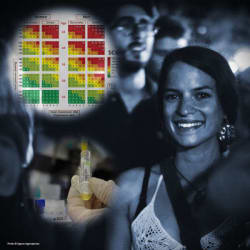Images
You have all heard about the DNA double helix and genes. Many of you know that mutations occur randomly, that the DNA sequence is read by successive groups of three bases (the codons), that many genes encode enzymes, and that gene expression can be regulated. These concepts were proposed on the basis of astute genetic experiments, as well as often on biochemical results. The original articles were these concepts appeared are however not frequently part of the normal curriculum of biologists, biochemists and medical students. This course proposes to read study and discuss a small selection of these classical papers, and to put these landmarks in their historical context. Most of the authors displayed interesting personal histories and many of their contributions go beyond not only the papers we will read but probably all their scientific papers. Our understanding of the scientific process, of the philosophy underlying the process of scientific discovery, and on the integration of new concepts is not only important for the history of science but also for the mental development of creative science.
Similar resources
Founded in 1559, the University of Geneva enjoys worldwide recognition and ranks amongst the top 100 best universities in the world. A polyvalent institution, it fosters the emergence of inter- and multidisciplinary fields in both research and teaching. It constantly strengthens its links with international Geneva, whilst contributing to the cultural, social and economic development of the region, notably through the promotion of research and its expertise in a wide range of fields.
UNIGE offers more than 500 programmes (including 136 Bachelor’s and Master’s degree programmes, 87 doctoral programmes) and 343 continuing education programmes covering an extremely wide variety of fields: exact sciences, medicine, humanities, social sciences, law, etc.
Its domains of excellence in research include life sciences (molecular biology, bio-informatics), physics of elementary particles, and astrophysics. UNIGE is also host and co-host to seven National Centres of Competence in Research: Frontiers in Genetics, MaNEP, PlanetS, SwissMap, Chemical Biology, Synaptic Bases of Mental Diseases and LIVES-Overcoming vulnerabilities in a life course perspective.
Just like the city of Geneva itself, the University enjoys a strong international reputation, both for the quality of its research (it ranks among the top institutions among the League of European Research Universities) and the excellence of its education. This acclaim has been won in part due to its strong ties to many national and international Geneva-based organizations, such as the World Health Organization, the International Telecommunications Union, the International Committee of the Red Cross, and the European Organization for Nuclear Research.


Water Resources Management and Policy

Planning your Wealth over a 5 year Horizon

Meeting Investors' Goals

To Screen or not to Screen? Methods and health policies through case studies

Make Smart Investment Decisions in a Global World














